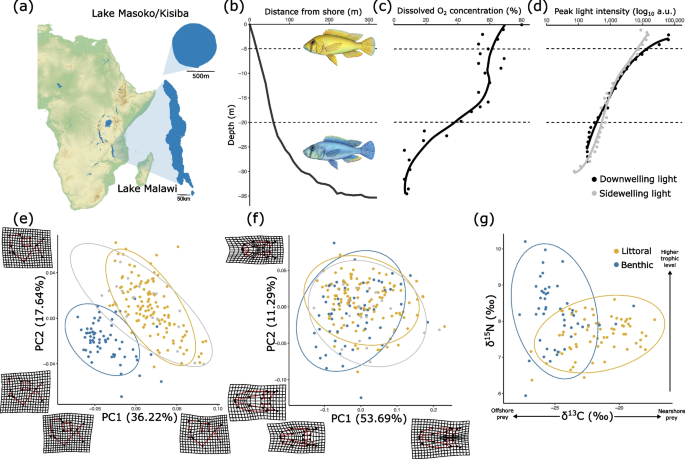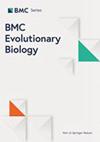Lateral line system diversification during the early stages of ecological speciation in cichlid fish
IF 3.4
Q1 Agricultural and Biological Sciences
引用次数: 0
Abstract
The mechanosensory lateral line system is an important sensory modality in fishes, informing multiple behaviours related to survival including finding food and navigating in dark environments. Given its ecological importance, we may expect lateral line morphology to be under disruptive selection early in the ecological speciation process. Here we quantify the lateral line system morphology of two ecomorphs of the cichlid fish Astatotilapia calliptera in crater Lake Masoko that have diverged from common ancestry within the past 1,000 years. Based on geometric morphometric analyses of CT scans, we show that the zooplanktivorous benthic ecomorph that dominates the deeper waters of the lake has large cranial lateral line canal pores, relative to those of the nearshore invertebrate-feeding littoral ecomorph found in the shallower waters. In contrast, fluorescence imaging revealed no evidence for divergence between ecomorphs in the number of either superficial or canal neuromasts. We illustrate the magnitude of the variation we observe in Lake Masoko A. calliptera in the context of the neighbouring Lake Malawi mega-radiation that comprises over 700 species. These results provide the first evidence of divergence in this often-overlooked sensory modality in the early stages of ecological speciation, suggesting that it may have a role in the broader adaptive radiation process.

慈鲷生态物种早期阶段的侧线系统多样化
机械感觉侧线系统是鱼类的一种重要感觉模式,为多种与生存有关的行为提供信息,包括寻找食物和在黑暗环境中导航。鉴于侧线系统在生态学上的重要性,我们可以预期侧线系统的形态在生态物种分化过程的早期会受到破坏性选择的影响。在这里,我们量化了马索科湖火山口慈鲷(Astatotilapia calliptera)的两个异形的侧线系统形态,这两个异形是在过去 1000 年内从共同祖先分化而来的。基于 CT 扫描的几何形态计量分析,我们发现,与浅水区近岸以无脊椎动物为食的沿岸生态型相比,在湖泊深水区占主导地位的浮游底栖生态型具有较大的颅侧线管孔。与此相反,荧光成像显示,没有证据表明不同形态之间在表层或管状神经膜的数量上存在差异。我们以邻近马拉维湖的 700 多个物种为背景,说明了我们在马索科湖 A. calliptera 中观察到的变异程度。这些结果首次证明了这种经常被忽视的感觉模式在生态物种分化早期阶段的分化,表明它可能在更广泛的适应性辐射过程中发挥作用。
本文章由计算机程序翻译,如有差异,请以英文原文为准。
求助全文
约1分钟内获得全文
求助全文
来源期刊

BMC Evolutionary Biology
生物-进化生物学
CiteScore
5.80
自引率
0.00%
发文量
0
审稿时长
6 months
期刊介绍:
BMC Evolutionary Biology is an open access, peer-reviewed journal that considers articles on all aspects of molecular and non-molecular evolution of all organisms, as well as phylogenetics and palaeontology.
 求助内容:
求助内容: 应助结果提醒方式:
应助结果提醒方式:


